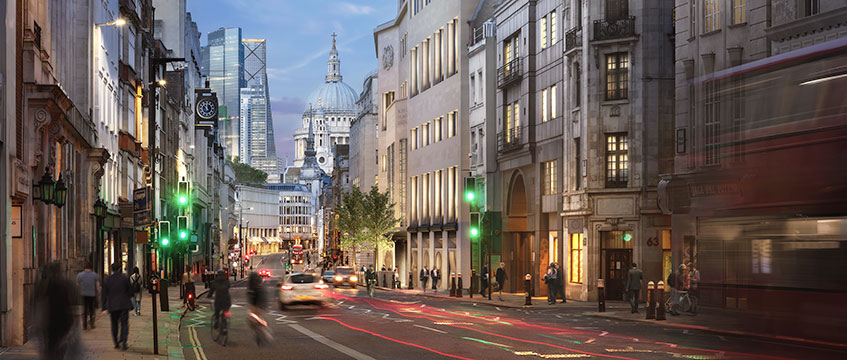Fleet Street set for £5bn real estate revamp
London’s Fleet Street and the surrounding area is set to be transformed through real estate projects with a combined development value of £5bn over the next five years.
A new report from the team behind the Fleet Street Quarter business improvement district is tracking 34 new and refurbished schemes that will provide around 3m sq ft of grade-A office, retail and leisure space.
Charlie Green, co-founder of the Office Group, described the area as a part of London that has been “underrated for too long”, adding that it is “full of beautiful, historic buildings”.
London’s Fleet Street and the surrounding area is set to be transformed through real estate projects with a combined development value of £5bn over the next five years.
A new report from the team behind the Fleet Street Quarter business improvement district is tracking 34 new and refurbished schemes that will provide around 3m sq ft of grade-A office, retail and leisure space.
Charlie Green, co-founder of the Office Group, described the area as a part of London that has been “underrated for too long”, adding that it is “full of beautiful, historic buildings”.
“If these buildings can be made to be modern, contemporary and current, then I think with the right kind of occupiers it’s an extraordinary opportunity,” he said.
Once home to the capital’s newspaper industry, the area is repositioning itself as a hub for businesses in the financial services, legal, and technology, media and creative industries.
The most high-profile projects under way include Co-Re’s redevelopment of the former Daily Express buildings at River Court, 120 Fleet Street, and the Qatari-backed redevelopment of the former Goldman Sachs headquarters at Peterborough Court, 133 Fleet Street.
The pipeline also includes the City of London Corporation’s plans to create a 525,000 sq ft Justice Quarter at Salisbury Square.
Shravan Joshi, planning and transportation chairman at the City of London Corporation, said the redevelopment of the Fleet Street area is “a once-in-a-generation opportunity”.
He said: “We don’t want to just build for today, we have to be planning for tomorrow.”
Speaking at a roundtable to launch the BID’s report, Joshi pointed to a “raw period of change” during which “the challenge for the BID is to make sure [the Fleet Street Quarter] is something worth the sum of its parts – to continue what this area has always done, which includes challenging money and power”.
The BID’s research found that around 25,000 new office workers could be drawn to the area by the upcoming office developments – but roundtable attendees stressed that encouraging people back to the traditional workplace was a challenge.
“You have to give occupiers a sense of theatre as well as a good space,” said Phillip Bennison, executive managing director at Intense Capital, the design, development and leasing co-ordinator of the Peterborough Court redevelopment.
Ross Sayers, head of development management for central London at Landsec, said: “For me, it’s about going with the heart, not the head, to get people inside. We need to take a risk and try something quickly and if it does work then look to formalise plans on a permanent basis.
“Sometimes it’s about taking the money for a new pavement and investing it into meanwhile uses and communal spaces.”
At Goldman Sachs, which left Peterborough Court in 2019 and moved to new offices at Plumtree Court on Farringdon Street, Mike Taylor, head of corporate and workspace solutions for EMEA, said: “Our focus is on dynamic and collaborative workplaces in locations that are reflective of the culture of our community. The neighbourhood we are in caters to a range of interests, with restaurants, bars, the arts and attractions, including the future plans for Museum of London. We are excited for what’s ahead.”
The quarter is seen as the midpoint between the City and the West End, and is already home to occupiers including Lego, Barings and award-winning creative studio Framestore, which helped produce the Paddington and Guardians of the Galaxy films.
The area’s BID, set up in 2022, represents more than 350 businesses across 106 acres of the western stretch of the City, bringing together representatives of public and private sectors, including developers, landlords and investors such as Landsec, Co-Re and Helical.
Lucy French, chief executive of the Fleet Street Quarter BID, added: “This part of London has been reinventing itself for 2,000 years. We, the people who work, live, play and invest here, are the custodians of its past and the curators of its future.
“This is a golden opportunity, a landmark moment. We are seeing the evolution of an area – an emerging, sustainable, inclusive hub for today and tomorrow.”
To send feedback, e-mail chante.bohitige@eg.co.uk or tweet @bohitige or @EGPropertyNews
See which agents are doing the most deals in the London submarkets with our On-Demand Rankings >>
Image © Eric Parry Architects











